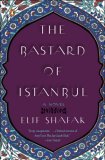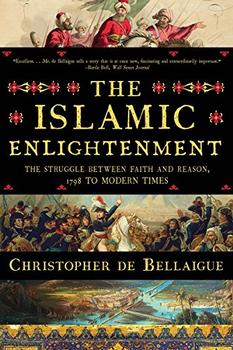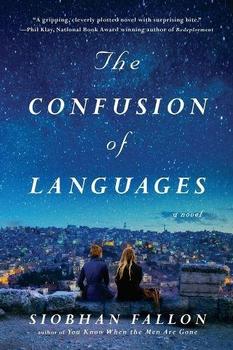Summary | Excerpt | Reading Guide | Reviews | Beyond the book | Read-Alikes | Genres & Themes | Author Bio

Shafak says that she did not set out to deal with big macro-political questions in The Bastard of Istanbul. Instead, her aim was quite the opposite - to "probe the simple and basic ingredients in the everyday life of Armenian and Turkish women" to find their commonalities.
"I am a novelist. When I write, I don't calculate the consequences of what I'm writing. I just surround myself with the story."
That maybe so, but The Bastard of Istanbul unleashed quite a backlash in her native Turkey, achieving the dubious honor of becoming the first fictional work to be tried under Article 301 of the Turkish penal code which prohibits "public denigration of Turkishness". Other fictional books, such as Orhan Pamuk's Snow have been threatened with Article 301* but Shafak's was the first to go to trial. If found guilty, Shafak could have spent 3 years in prison. She couldn't attend the proceedings as she had just given birth to her first child, so she watched the television reports about her own trial from her hospital bed. Thankfully, she was acquitted, but the consequences of her trial and of her book, which is a bestseller in Turkey, will continue to reverberate for sometime to come.
"The Bastard of Istanbul is just a novel, but it set off a chain of unexpected events. As I look at my baby daughter, I only hope the chain will end in a free and open Turkey where she can grow up saying what she believes - without fear of any consequences."
The Bastard of Istanbul tells of two
extended families, a Turkish Muslim family living in Istanbul
with an estranged brother in Arizona, and an Armenian-American
family in San Francisco. The superficial link between the
families is Armanoush, known as Amy, daughter of one family and
step-daughter of the other. Amy, brought up on tales of the
Armenian diaspora, decides to unexpectedly visit her step-family
in Istanbul, where she becomes firm friends with her
step-cousin, Asya, and inadvertently triggers a series of events
that will reveal a a much older link between the two families.
The Bastard of Istanbul examines how the atrocities of
the past have shaped the current time, in this case the atrocity
of the Armenian genocide. Shafak probes deeply into the the
contrast of amnesia versus memory; the majority-Muslim
population of Turkey tend to be either not aware of the
magnitude of the genocide or feel that it is not their
responsibility (the genocide took place before the Republic of
Turkey was formed - see sidebar), whereas for the Armenian
population, in particular the émigré population, the memories
remain bitterly fresh, and made worse by the official denial of
the Turkish government.
Through her diverse characters, Shafak explores the contrasting
opinions of Amy's Armenian-American family in San Francisco and
the members of the Armenian-American online chatroom where Amy
hangs out, versus Amy's Turkish step-family in Istanbul and the
people she meets there. One of the most telling exchanges is
between an Armenian man that Amy meets in Istanbul who, in
response to her sincere and well meant offer that if he was
being oppressed in Turkey she knew many Armenian communities in
America who would be more than happy to help him replies:
"Why would I want to do that, dear Armanoush? This city is my city. I was born and raised in Istanbul. My family's history in this city goes back at least five hundred years. Armenian Istanbulites belong to Istanbul, just like the Turkish, Kurdish, Greek, and Jewish Istanbulites do. We have first managed and then badly failed to live together. We cannot fail again."
This sentiment is echoed by another character
who Amy chats with online who goes by the nom de plume "Baron
Baghdassarian", who delivers a powerful indictment: "Just like
the Turks have been in the habit of denying their wrongdoing,
the Armenians have been in the habit of savoring the cocoon of
victimhood".
At the risk of reducing one of the worst instances of genocide
in the 20th century to an analogy, Shafak's message seems clear
- the Armenians and Turks are two parts of the same estranged
family, held apart by a rift that can only be closed by one side
acknowledging and apologizing for the events of the past, and
the other starting to look towards the future, and not the past.
In recent years, the leaders of many countries have officially
apologized or "expressed regret" for historic actions against
other countries. It's long overdue that the Turkish government
did the same.
Shafak's leisurely, gently humorous, narrative of two families
of strong women makes for easy, entertaining and elucidating
reading - it is one of those very rare books that actually
improves upon reflection.
*Just last month, a lawyer instrumental in filing cases against Shafak and other writers was arrested under suspicion of attempting to assassinate Orhan Pamuk - see BookBrowse news story.
Elif Shafak was born in
Strasbourg, France in 1971. Her mother was a diplomat and single-mother whose first appointment was in Spain, where Shafak
spent her teenage years. At the time, the Armenian Secret Army
for the Liberation of Armenia (ASALA) was staging attacks on
Turkish citizens, particularly diplomats, across Europe; so
while she was growing up "Armenian" meant only one thing to
Shafak - a terrorist who wanted to kill her mother.
Faced with hatred she says she hated back. It took her years to
ask the simple question: Why did the Armenians hate us?
"My ignorance was not unusual. For me in those days, and for most Turkish citizens even today, my country's history began in 1923, with the founding of the modern Turkish state. The roots of the Armenians' rage -- in the massacres, atrocities and deportations that decimated Turkey's Armenian population in the last years of Ottoman rule, particularly 1915 - were simply not part of our common historical memory."
She spent her childhood in Madrid, Spain; Amman, Jordan and Cologne, Germany, before returning to Turkey as a young adult, but it was not until she came to the US in 2002 and started getting involved in an Armenian-Turkish intellectuals' network that she felt the need to face the charges that, beginning in 1915, Turks killed as many as 1.5 million Armenians and drove hundreds of thousands more from their homes.
"With each step, I realized not only that atrocities had been committed in that terrible time but that their effect had been made far worse by the systematic denial that followed. I came to recognize a people's grief and to believe in the need to mourn our past together."
She has published five novels, the first of
which was Pinhan, published in Turkey when she was 27,
about a hermaphrodite mystic; her most recent two novels, The
Saint of Incipient Insanities (2004) and The Bastard of
Istanbul were written in English. She is currently an
Assistant Professor in the Near Eastern Studies Department at
The University of Arizona. She is married to Eyup Can, a
journalist, with whom she recently had a daughter. She divides
her time between Istanbul and Arizona.
According to Shafak there are four attitudes to the "Armenian
question" in Turkey today:
Useful Links
![]() This review was originally published in The BookBrowse Review in March 2007, and has been updated for the
February 2008 edition.
Click here to go to this issue.
This review was originally published in The BookBrowse Review in March 2007, and has been updated for the
February 2008 edition.
Click here to go to this issue.

If you liked The Bastard of Istanbul, try these:

by Christopher de Bellaigue
Published 2018
A revelatory and game-changing narrative that rewrites everything we thought we knew about the modern history of the Islamic world.

by Siobhan Fallon
Published 2018
A searing debut novel from the award-winning author of You Know When the Men are Gone, about jealousy, the unpredictable path of friendship, and the secrets kept in marriage, all set within the U.S. expat community of the Middle East during the rise of the Arab Spring.
Your guide toexceptional books
BookBrowse seeks out and recommends the best in contemporary fiction and nonfiction—books that not only engage and entertain but also deepen our understanding of ourselves and the world around us.